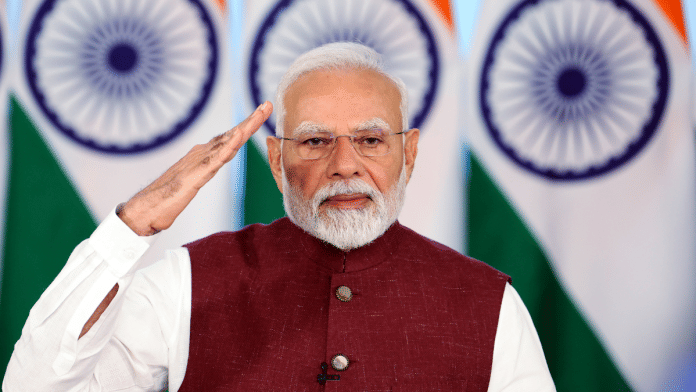New Delhi: If there are talks between India and Pakistan, it will be only on terrorism and Pakistan Occupied Kashmir (PoK), asserted Prime Minister Narendra Modi Monday, in his first address to the nation after Operation Sindoor began. He emphasised that India has only paused its retaliatory action against Pakistan, and will monitor the neighbour’s every move. India will not tolerate “nuclear blackmail”, the PM said.
His remarks came two days after the US President Donald Trump announced ceasefire between the two nations following intense military action.
“…If there will be talks between India and Pakistan, it will only be on terrorism and Pakistan Occupied Kashmir (PoK)…India’s stand has been clear, terror, trade and talks cannot go together,” said Modi.
“Terror and talks cannot coexist. Terror and trade cannot go hand in hand. Blood and water can never flow together,” he added.
India launched Operation Sindoor on 7 May as a response to the 22 April Pahalgam terror attack in which 26 people were killed. The operation targeted nine terror hubs in Pakistan and PoK. The terror headquarters and training camps of Jaish-e-Mohammed and Lashkar-e-Taiba were among the targets hit.
The PM outlined India’s security doctrine in three parts, with the first being the decisive retaliation wherein any terrorist attack on India will be met with a strong and resolute response.
“India will retaliate on its own terms, targeting terror hubs at their roots. There will be no tolerance for nuclear blackmail; India will not be intimidated by nuclear threats,” said the PM, adding that any terror haven operating under this pretext will face precise and decisive strikes.
Modi also stressed that there will be “no distinction between terror sponsors and terrorists”, and “India will no longer see terrorist leaders and the governments sheltering them as separate entities”.
The PM said India will assess and observe every step taken by Pakistan and India’s response will be based on that. He confirmed that it was Pakistan that reached out to India first in a bid to de-escalate.
“Within the first three days of India’s response, Pakistan suffered destruction far beyond its expectations. Following India’s aggressive countermeasures, Pakistan began seeking ways to de-escalate, appealing to the global community for relief from rising tensions. When Pakistan appealed, when it said that it will not indulge in any further terrorist activities and military audacity, India also considered it,” Modi asserted. “And I am repeating again, we have just suspended our retaliatory action on Pakistan’s terrorist and military bases. In the coming days, we will measure every step of Pakistan on the basis of what attitude it adopts.”
Terrorists dared to wipe the sindoor (vermilion) from the foreheads of our sisters, that’s why India destroyed the very headquarters of terror, the PM declared.
Modi said Operation Sindoor has redefined the fight against terror, “setting a new benchmark”, establishing a “new normal”. While this is not an era of war, it also not an era of terrorism, he added. “The Pakistani Army, the government of Pakistan..the way they continue to nurture terrorism, one day it will lead to Pakistan’s own destruction.”
Condemning the Pahalgam terror attack, the PM said it had shocked both the nation and the world.
Calling it a “gruesome display of terror”, where innocent civilians enjoying their holidays were brutally killed after being questioned about their faith, right in front of their families. Modi said this was “not just an act of cruelty but also a vile attempt to fracture the nation’s harmony”.
“Operation Sindoor is not just a name but a reflection of the emotions of millions of Indians”, Modi said while describing it as an unwavering pledge to justice, one that the world witnessed being fulfilled on 6-7 May.
Pakistan had prepared to strike at our borders but India hit them right at their core, he added.
Modi went on to say in his address that India’s missile and drone strikes on terrorist hubs in Pakistan “shattered not only their infrastructure but also their morale”.
Locations like Bahawalpur and Muridke had long operated as centers of global terrorism, he added, and had links to major attacks worldwide, including 9/11 in the US, the 2005 London Tube bombings, and decades of terror incidents in India.
“The operation resulted in the elimination of over 100 dangerous terrorists, including key figures who had openly plotted against India for decades,” Modi said.
The Prime Minister asserted that for India to uphold peace, it must be strong, and when necessary, that strength must be exercised.
(Edited by Gitanjali Das)
Also Read: Did India hit ‘nuke storage’ facility in Pakistan’s Kirana Hills? Here’s what IAF ops chief said






